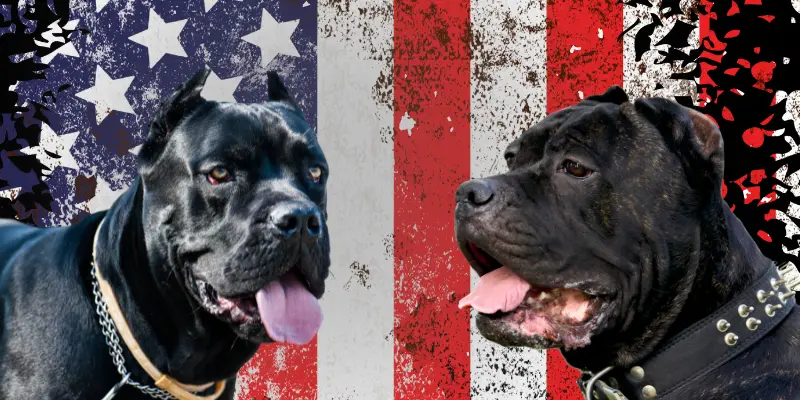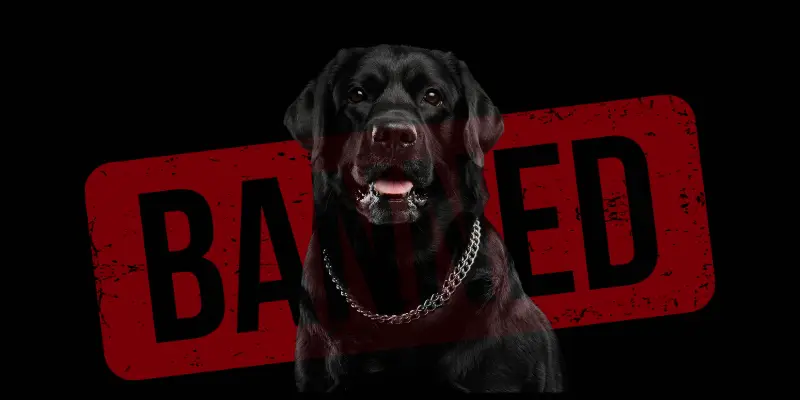Table of Contents
When it comes to owning a dog, the breed you choose is as much about compatibility with your lifestyle as it is about compliance with local laws. This raises an important question for us to think about: Are cane corsos banned anywhere in the US? Many people have fallen in love with Cane Corsos because of their beautiful look and protective nature.

But their frightening presence has also sparked discussions in a number of American communities. As a breed known for its strength and guardian instincts, it’s essential to understand where and why restrictions have been placed on owning these noble creatures. This discussion is not just about identifying locations with bans but understanding the broader implications for potential owners and the breed itself.
The Cane Corso’s history
The Cane Corso is a breed rich in history, dating back to ancient Rome, when they were used as property protectors and as battle dogs. Over the centuries, their roles evolved, but their characteristics of loyalty, strength, and protectiveness remained constant.
Knowing the history of the breed is essential to understanding why they are adored and, at times, feared. The journey from Roman battlefields to modern-day homes highlights the breed’s adaptability and enduring spirit.

Are Cane Corsos Dangerous?
The question of whether are king corso dangerous is a topic of much debate. The Cane Corso, like any big breed, may be dangerous if it is not socialized and taught correctly. However, labelling them as inherently dangerous oversimplifies the issue.
Various factors influence the breed’s temperament, including upbringing, environment, and training. While incidents involving Cane Corsos have occurred, these are not indicative of the breed as a whole but rather exceptions, often resulting from negligence or abuse.

Are Cane Corsos Illegal?
Exploring the question, are cane corsos illegal reveals a complex landscape of breed-specific legislation. These laws vary significantly from one jurisdiction to another, with some areas imposing strict regulations or outright bans on ownership.
The rationale behind such legislation often stems from concerns over public safety and the potential for aggression, categorizing the Cane Corso alongside other dogs banned in the USA for being perceived as a cane corso dangerous dog.
Are Cane Corsos Illegal in Texas?
Texas, known for its diverse laws across counties and cities, provides a nuanced picture regarding cane corso legality. While there isn’t a statewide ban, some local ordinances might classify Cane Corsos as dangerous dogs, affecting their ownership. Prospective owners in Texas must navigate a patchwork of regulations, ensuring they comply with local requirements to avoid categorizing their pets as part of illegal dog breeds in the USA.
Also Read: The Formentino Cane Corso – History & Facts with Pictures
Where Are Cane Corsos Banned?
When it comes to restrictions, where are cane corsos banned is a question with a complex answer.In the US, different jurisdictions might have quite different laws regarding the ownership of Cane Corsos. The right to acquire a Cane Corso is directly impacted by breed-specific legislation (BSL) that has been implemented by some counties and localities.
These laws often respond to perceived threats to public safety, though they are controversial and subject to change. Potential owners need to research local laws thoroughly to ensure compliance and consider the implications of these bans on their choice of pet.

The rationale behind the decision to ban or restrict ownership of Cane Corsos centers around concerns over public safety. Why “Are Cane Corsos Banned Anywhere in the US” stems from incidents where dogs, perceived as aggressive or dangerous, have harmed people or other animals.
Also Read: Cane Corso Bullmastiff Mix – History & Facts with Pictures
What States Are Cane Corsos Banned?
Identifying which states have restrictions on King Corsos is crucial for responsible pet ownership. Although no state in the U.S. outright bans the breed at the statewide level, certain local municipalities within states have enacted breed-specific legislation (BSL) targeting or restricting Cane Corsos, among other breeds considered potentially dangerous.
This patchwork of regulations underscores the importance of prospective owners conducting thorough research within their specific locality to understand the legal stance on Cane Corsos. The question, “Are Cane Corsos Banned Anywhere in the US,” is nuanced, highlighting the need for potential owners to navigate the complex landscape of local laws to ensure compliance and responsible ownership.
Cane Corso Banned Countries
Beyond the US, the status of the Cane Corso varies, with some countries labelling them as dogs banned in America and beyond. These international restrictions underscore the breed’s controversial status, influenced by perceptions of them as cane corso dangerous. Potential international owners must be aware of these laws to ensure they do not inadvertently violate cane corso banned country regulations.
Breed-Specific Legislation
When it comes to dog ownership in the United States, the rules can be as varied as the breeds themselves. The Cane Corso is one breed that frequently finds itself at the centre of legal debates. Laws that restrict or outlaw particular dog breeds are known as breed-specific legislation (BSL), and their purpose is to lessen dog attacks on people and other animals.
The Cane Corso, a breed known for its size, strength, and protective nature, has been subject to this kind of legislation in certain areas. These laws are often the result of concerns over public safety, but they raise questions about effectiveness and fairness. Critics argue that such policies unfairly penalize specific breeds, suggesting that responsible ownership and education are key to preventing dog bites and attacks.
Are Cane Corsos Banned Anywhere in the US? Interesting Facts
Despite the controversy, there are some interesting facts about the Cane Corso ban. For instance, not all areas with BSL target the Cane Corso specifically; rather, they may focus on a list of breeds considered to be dangerous. The Cane Corso’s inclusion on these lists often depends on local government assessments of dog behaviour and attack statistics.

Furthermore, in places where the Cane Corso is banned or restricted, owners may face requirements such as mandatory neutering, muzzling in public spaces, and special liability insurance. These steps aim to reduce the dangers that come with having a breed that is thought to be potentially harmful.
Frequently Asked Questions
Q1. Are cane corsos dangerous?
Ans: The temperament of a Cane Corso, like any dog breed, can be influenced by various factors, including genetics, training, socialization, and owner behaviour. While they have a protective nature, proper training and responsible ownership can mitigate aggressive tendencies.
Q2. Where are cane corsos banned?
Ans: Specific bans and restrictions can vary widely from one municipality to another. It’s essential for potential owners to check the local laws in their area.
Q3. Is it legal to own a cane corso?
Ans: In many places, yes, but with potential restrictions based on local BSL.
Q4. Why are some dog breeds banned in the US?
Ans: Certain breeds are banned due to perceptions of an increased risk they pose to public safety.
Q5. Cane corso illegal in what states?
Ans: States where some form of BSL affecting Cane Corsos exists include Arkansas, Colorado, Idaho, Kansas, Nebraska, Oregon, South Dakota, and Washington.
Conclusion
In conclusion, the question, Are cane corsos banned anywhere in the US? Uncovers a complex web of breed-specific legislation that varies significantly across the country. While some areas impose restrictions or outright bans on Cane Corsos, these measures are not universal.
The debate over such legislation continues, with advocates for and against BSL voicing strong opinions on the best ways to ensure public safety while also protecting the rights of responsible dog owners. As we navigate this contentious issue, it becomes clear that education, responsible ownership, and community engagement are crucial components in fostering safe environments for all—both humans and their canine companions.

